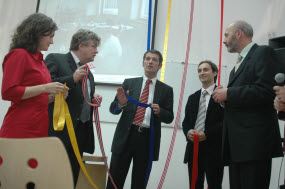
|
From the opening of the innovation centre in Tuzla, autumn 2005. |
For its first birthday, the centre is being given training equipment for ICT personnel by the Trondheim-American company Atmel Norway and the Norwegian Foreign Ministry.
Thirteen companies under one roof
Financed by Norwegian aid funding, and with the support of local authorities, SINTEF has led efforts to build up an “incubator” for ICT companies in Tuzla, a university city about the size of Trondheim and centre of a region with a population of 750,000. The Industrial Development Corporation of Norway (SIVA) has also participated in the project.
One year after its opening, 13 companies have their premises in the centre, and by the end of the year this number will probably have risen to 15. Companies in the centre say that they expect to need 15 more engineers in the course of the next twelve months.
Reducing the brain drain
Until recently, eight out of every ten graduates from the Tuzla region have gone abroad to find work.
“Luckily, these new companies have reduced this outward flow, which has been draining the country of valuable young people. The centre has aroused a great deal of local interest,” says SINTEF’s project manager in Tuzla, senior consultant Torkel Ystgaard of SINTEF Technology and Society.
Gifts from Norway
The first anniversary of the Tuzla innovation centre was celebrated with the news that the centre is now to have a training centre for ICT personnel. The birthday gifts from the Trondheim-American company Atmel Norway and the Norwegian Foreign Ministry will be used by both the training centre and the University of Tuzla.
“Class set” for training purposes
Atmel Norway has its headquarters in Trondheim, at has become the most important and fastest-growing business area in a global group that has some 7000 employees.
The group’s Norwegian branch is one of the world’s biggest suppliers of microchips for the control of everyday electronic equipment. These chips are the brains of everything from mobile telephones and dishwashers to video cameras and car radios.
The gift from Atmel Norway consists of development tools that the company has created for its own clients. These tools help programmers to write the equipment-specific programs that will run on the microchips. The gift to Bosnia consists of a “class set” of these development tools.
Social responsibility and commercial potential
“As a Norwegian-American company, we feel that it is right to go in and take responsibility in severely stressed areas where democratic processes are now being developed. We also know that our own staff appreciate the fact that we are taking on a social responsibility,” says managing director Vegard Wollan in Atmel Norway.
At the same time, Wollan does not conceal his company’s hopes of reaping certain long-term commercial gains from its engagement in Tuzla.
A complete laboratory
“If the companies that are springing up in Tuzla do well, they could form the core of a growing electronics sector in Bosnia. The development equipment that we are donating will make programmers familiar with our products. In the long term, that could give us a foot in the door there. But whether this will happen in two or three years, or in four or five, we don’t know,” says Wollan.
The Foreign Ministry’s gift is a cash donation that will go to the purchase of PCs, measurement instruments, and so on. These will complement the donation from Atmel Norway, so that taken together, the two gifts will make up a complete training laboratory.
High unemployment
The unemployment statistics for the canton that Tuzla belongs to leave us in no doubt that new companies are badly needed. The official figures says that 54 percent of the employable population have no job. In this canton alone, eighteen hundred job-seekers with four-year university degrees are unemployed.
“The number of applicants to the University of Tuzla was falling, but the Faculty of Technology says that more people are applying again, and they are in no doubt that the possibility of finding work at the BIT Center is one of the reasons,” says SINTEF’s Torkel Ystgaard.
Learning from each other
The BIT Center has concentrated on ICT, because starting up new companies in this sector is less capital-intensive than other industries. The centre offers premises and common services. An important part of its business concept is that tenants should learn from one another.
Five of the companies make their money exclusively from exports. The other eight serve local and regional markets.
”Look to Bosnia!”
Norway’s Foreign Ministry is now funding a new SINTEF project in Tuzla. Once again SIVA, which is headquartered in Trondheim, is a participant. The aim is to transform the centre into a ”Science Park”, i.e. an environment that will attract R & D groups from foreign companies.
”At present, only four percent of households in Bosnia and Herzegovina have access to the Internet, but this situation is about to change, and it will evolve rapidly, which means that there will be room in this market for many products. I hope that mid-Norwegian companies realise this too, because in Tuzla, there will be no lack of competent workers, “ says Ystgaard.
By Svein Tønseth
